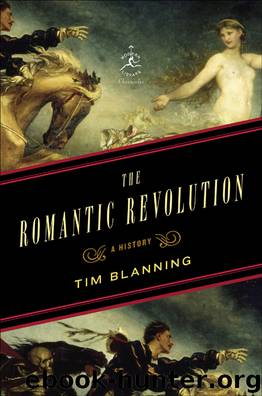The Romantic Revolution by Tim Blanning

Author:Tim Blanning [Blanning, Tim]
Language: eng
Format: epub, mobi
ISBN: 978-0-679-60500-3
Publisher: Random House Publishing Group
Published: 2011-08-01T16:00:00+00:00
The little rose said: I will pierce you,
So you always think of me
And remember that I will not allow it.
Little rose, little rose, little rose red,
Little rose on the heath.
Nevertheless the rough boy plucked
The little rose on the heath.
The little rose resisted and pierced him.
But afterwards in the pleasure
He forgot the pain.
Little rose, little rose, little rose red,
Little rose on the heath.
As his most recent biographer has observed, “Goethe could hardly have come closer to the impossible, to writing a true folk-song.”46 Herder published it in 1773, claiming it was from memory, enhancing its “folk” status by implying it had passed to him via oral transmission. The strophic structure and the repetition of the last two lines ensured that it would be set to music again and again, most famously by the eighteen-year-old Franz Schubert in 1815.
Whether it was collecting folk songs or writing verse in the style of folk songs, populism became an integral part of romantic literature. Surprisingly precocious when it came to collecting was Russia, where as early as 1735 the court poet Vasily Trediakovsky had drawn attention to the importance of the “natural, ages-old poetry of the simple people”47 and Mikhail Chulkov had published several large collections of fairy tales and folk songs in the 1760s and 1770s.48 Russian folklore then found its way into the European mainstream through the influence it exerted on poets, especially Alexander Pushkin. In his first major work, Ruslan and Ludmila (1820), Pushkin drew on traditional linguistic sources ranging from church Slavic to vernacular Russian to create the perfect medium of his fantastic tale of the rescue of the Kievan princess Lyudmila from the evil dwarf-magician Chernomor.49
In Germany, Ludwig Achim von Arnim and Clemens Brentano’s collection The Boy’s Magic Horn [Des Knaben Wunderhorn], published between 1805 and 1808, quickly became a “cult book” for romantics.50 In a postscript the editors told their readers that the aim of their collection had been to conjure up “the fresh morning air of old-German times.” They also injected a political note by observing that the rage for novelty in France had led to the virtual extinction of folk songs even before the Revolution—and perhaps had even made that Revolution possible.51 That Achim von Arnim and Brentano engaged in what might be called “creative editing,” altering meter and spelling and even rewriting, did not detract from its colossal and enduring impact. Over the next century or so, hundreds of musical settings of its two-hundred-odd poems were composed by, among others, Brahms, Britten, Bruch, Eisler, Ives, Gounod, Humperdinck, Mahler, Mendelssohn, Reger, Reichardt, Schoenberg, Schreker, Schumann, (Richard) Strauss, Weber, Webern, and Zemlinsky, to mention only the more celebrated.52
At least one of these demonstrated that populism could also be popular. This was Carl Maria von Weber (1786–1826), who steeped himself in German folk songs, singing them to his own guitar accompaniment.53 The most successful result was his romantic opera Der Freischütz, first performed at the new Playhouse (Schauspielhaus) at Berlin in 1821. In one number after another, Weber showed how to make art seem artless.
Download
This site does not store any files on its server. We only index and link to content provided by other sites. Please contact the content providers to delete copyright contents if any and email us, we'll remove relevant links or contents immediately.
The Secret History by Donna Tartt(16658)
Red Sparrow by Jason Matthews(4684)
Harry Potter 02 & The Chamber Of Secrets (Illustrated) by J.K. Rowling(3293)
In a Sunburned Country by Bill Bryson(2953)
Figure Drawing for Artists by Steve Huston(2804)
The Daily Stoic by Holiday Ryan & Hanselman Stephen(2712)
Drawing Cutting Edge Anatomy by Christopher Hart(2683)
The Roots of Romanticism (Second Edition) by Berlin Isaiah Hardy Henry Gray John(2569)
Japanese Design by Patricia J. Graham(2562)
Make Comics Like the Pros by Greg Pak(2431)
Stacked Decks by The Rotenberg Collection(2283)
Harry Potter and the Deathly Hallows (7) by J.K. Rowling(2223)
On Photography by Susan Sontag(2136)
Draw-A-Saurus by James Silvani(2108)
Tattoo Art by Doralba Picerno(2086)
Foreign Devils on the Silk Road: The Search for the Lost Treasures of Central Asia by Peter Hopkirk(2059)
Harry Potter and the Prisoner of Azkaban (Book 3) by J. K. Rowling(2041)
The Traveler's Gift by Andy Andrews(2017)
Churchill by Paul Johnson(2016)
